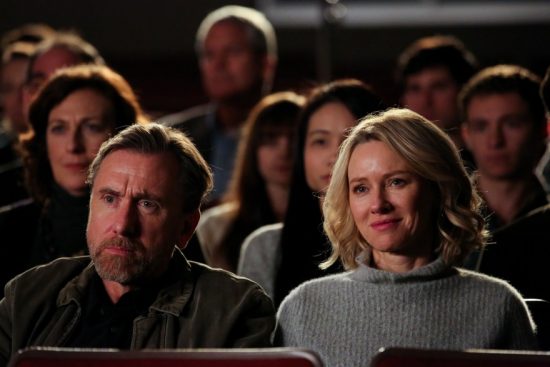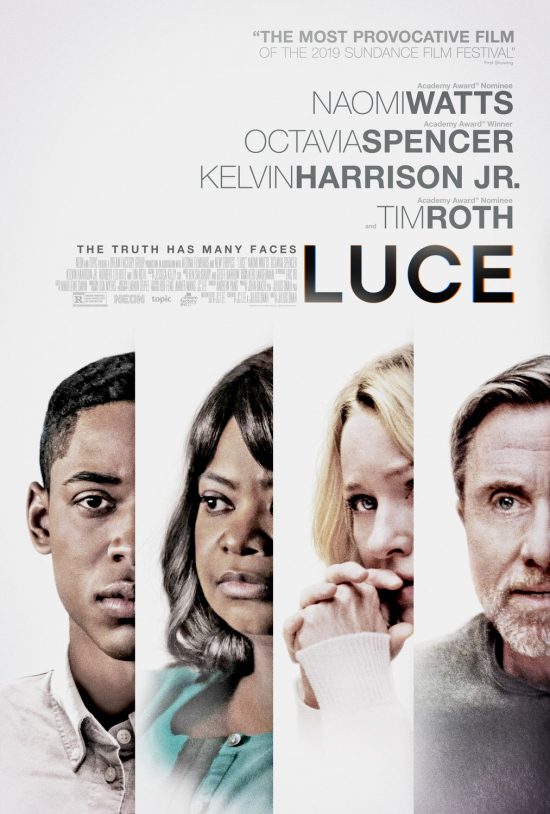Review: Luce – “Occasionally compelling, but frequently frustrating”
Director Julius Onah’s Sundance hit taps into uncomfortable representations of race and identity in modern America. Luce asks its spectator “what is the model immigrant?” in a manner which is intentionally pressing, but ultimately flawed. Despite the film’s intention to unearth complex subject matter within a punchy contemporary thriller framework, its attempts largely feel lacklustre; failing to truly provoke or challenge.
From the introductory frame here, we are goaded; destined to be fired up by the proceeding events. The plot is set in motion by an essay that Luce Edgar, (played by It Comes At Night breakout star, Kelvin Harrison Jr.), a highly decorated star student, turns in to his history teacher, Harriet Wilson (Octavia Spencer). Asked to write the paper in the voice of a historical figure, Luce picks Frantz Fanon – the Martinican revolutionary who argued that violence is sometimes necessary in the struggle against colonialism.
So convincing is the tone of Luce’s work, that warning bells start sounding for Wilson. Perhaps he is a radical; perfectly cloaked in the façade of a model student? Maybe even a danger to other students? Wilson challenges Luce, who attests he has simply fulfilled the homework brief. This provocation kickstarts a circus of moral mysteries, and social injustices. Because, you see, the real hot topic here is whether Wilson has an issue with what her student penned, or simply who he is.
Perhaps the most interesting undercurrent rippling throughout Luce is not so much the overarching depiction of race, but how the titular character – a black refugee, pulled from a war-zone and homed by two desperately white-privileged, picket-fence Americans (Naomi Watts and Tim Roth) – is perceived by those within the environment he inhabits. In many ways, Luce mirrors that of a young O.J. Simpson; handsome, universally adored, athletic, successful. Simpson, in his early years, was never seen as black. His race did not affect his social status or credibility, and somehow managed to surpass scrutiny in a period of unparalleled injustice and segregation.
Onah’s co-written screenplay – adapted with original playwright J.C. Lee – works best in its efforts to showcase Luce as “different” to other students at his suburban high school. The tension amplifies as his seeming state of invincibility remains despite rumours, accusations and inquiries, breeds a simmering fire pit of jealousy for his lesser represented and celebrated colleagues. However the script loses its footing when attempting to pin down the film’s central argument – it is quite simply too dense and multi-stranded for this slight 109 minute to handle.
Often this author was left feeling dissatisfied and underwhelmed by the feeble attempts to channel hot and heavy themes of systematic racism, culture, and immigration into a largely ordinary domestic drama. Onah clearly wants to tap into the darker, more sinister themes of Luce’s heritage – and whether they have imprinted on his identity – but his efforts are as successful as taking an African Lion home and trying to pet it like a kitty. Luce should have quiet menace, but instead he comes across as brattish and irritating. Seeing as the film is being marketed as a mystery, it is sadly void of much mystique.
Lashings of Lynne Ramsay’s moody teen chiller, We Need To Talk About Kevin, bubble away in the film’s more brooding moments. You’ll find them hidden behind rows of faked smiles – awash with glowing white teeth – and awkward glances and stares. Largely these scenes are “complimented” with a warbling bass track slaps like an underground dubstep rave. Suffice to say, Luce severely lacks subtlety, which is deeply regrettable because that can easily be confused with a lack of depth, which is not the case. There is little doubt that important messages, and powerful arguments are constructed here, but they become silenced by an obnoxious and misjudged tone which ensures the spectator has no room for interpretation or opinion.
Upon reflection, one can’t help but think Luce as a character study is far better suited to the stage – its native home. Onah’s film lacks the texture and cinematic craft to warrant its placement on the silver screen, and its central themes and motives suffer accordingly. At the theatre – living and breathing in the moment – it would likely work very differently; serving as a rugged think piece prepped for debate.
Still, the film isn’t all bad. Harrison Jr. is largely impressive as the eponymous Luce; particularly excelling when delivering passionately scripted speeches to his peers (he’s the leader of the debate team, as well as the best Track and Field sportsman, obviously). He carries nearly the entire weight of the project, and continues to earn his stripes as an impressive young talent to watch. Watts and Roth, as parents Amy and Peter, are little more than spare parts in the grand scheme of things. Few buttons are pressed about their reasonings for adopting Luce in the first place – were they selfless or selfish? Equally, their motivations which develop throughout become more irritating than absorbing.
Spencer on the other hand, is largely excellent. Without question the brightest bulb in this tanning bed, Harriet Wilson is a complex and questionable figure; one entirely consumed with an agenda, and one willing to risk her personal and professional integrity to prove it. There is a delicate bitterness to her tongue, and a cunningness in her stillness; showcasing her range with not just dialogue delivery, but physicality. Her body language speaks volumes.
Overall, Luce is an occasionally compelling, but frequently frustrating experience. Its gnashing teeth simply don’t sink in deep enough, and the network of pressure-cooker topics fail to ignite the roaring fire they set out to.
Luce opens in UK cinemas on Friday 8th November, courtesy of Universal Pictures.















